Good morning.
Don’t look now, but crypto’s latest hype cycle may be coming to an end. After a media maelstrom over bitcoin ETFs in January, just 2.6% of financial advisors said they are actually recommending crypto to clients, according to a recent report from Cerulli Associates that interviewed 1,500 of them. Many advisors have seen virtually zero interest from clients and struggle to find the right fit for crypto in clients’ portfolios.
With all the razzmatazz fizzling out, clients simply don’t care about crypto — that means advisors don’t either.
Risk-Free Investing? These ETFs Offer 100% Downside Protection

It’s tough to believe anyone who claims to make money in the stock market without risking a dime — unless, of course, that someone is named BlackRock, Fidelity, or PGIM Investments.
Some of the world’s most trusted financial institutions have launched new exchange-traded funds in recent months that offer complete downside protection. By using options trades, like puts and calls, the strategy can guarantee investors will only lose a percentage of their initial principal. Of course, there’s a catch: Potential gains are also capped, meaning investors may leave valuable returns on the table.
As interest rates are expected to edge higher through the end of the year, the strategies could continue to pick up steam as money managers reposition cash holdings in relatively low-risk products.
Don’t Be a Bear
Buffered ETFs have quickly become the hot new trend in wealth management, with assets topping $47 billion in some 270 funds, according to Kiplinger. BlackRock — which manages $25 billion in assets in more than 40 active ETFs — introduced the iShares Large Cap Max Buffer Jun ETF last week. “With record levels of cash sitting on the sidelines, many investors are looking for tools to help navigate market volatility before they step back into the market,” said Rachel Aguirre, BlackRock’s head of iShares Product Engineering in the US.
The products could be a good option for clients who are trying to minimize the bill to the tax man. Rather than investing excess cash in money market funds where returns would be taxed at ordinary income rates, clients can take cash off the sidelines and utilize tax-deferred capital gains rates upon sale of the ETF, according to Andrew Herzog, an advisor with The Watchman Group.
What’s the Catch? Buffered ETFs have caught fire as of late. However, complicated investing strategies using option calls can also become very expensive. These defined-outcome ETFs are some of the more expensive investing options:
- The average expense ratio is 0.78% for these products, which is higher than most ETFs.
- With 195 ETFs traded on the US markets, Buffer ETFs have total assets under management of $37 billion, according to VettaFi data.
“If the buffered ETF, that’s tied to an index, remains flat over the outcome period, then your money did nothing,” Herzog told The Daily Upside. “It sat there like cash in a checking account. That’s the risk someone ultimately takes.”
Investors Flock to Indian Fintechs Amid Wealth Boom
Private equity is betting that Indian investors will want financial apps they can quickly access from their pockets, in lieu of chatting across mahogany desks.
The nation’s wealthtech startups are not only benefiting from a growing middle class, but also looking to court some of the country’s wealthiest citizens, and financial backers like their odds. PE firms are pouring tens of millions of dollars into India’s wealthtech sector as the country’s GDP and overall affluence rise.
Lightspeed Venture Partners — a US-based firm with $25 billion in AUM — is on the verge of leading a funding round of more than $20 million in Centricity, a wealth management platform, sources recently told TechCrunch. And back in 2022, New York’s Tiger Global backed a $22.6 million investment into Jar, an Indian startup that allows users to buy and sell gold assets.
Bangalore’s Premji Invest is reportedly expected to lead a funding round of between $30 million and $40 million in Dezerv, an app for high-income investors. Peak XV Partners, also based in Bangalore, will pump $35 million into wealth and asset management app Neo.
Country on the Grow
India is expected to be the fastest-growing major economy this year, with the International Monetary Fund forecasting a GDP growth rate of 6.8%. The country is quickly becoming an alternative to China for companies looking to diversify their supply chains and derisk from the Middle Kingdom.
At the same time, individual wealth is growing, too:
- Between 2019 and 2023, the compound annual growth rate of “affluent” Indians — those earning more than $10,000 a year — grew an estimated 12 times faster than the CAGR of India’s population, according to a Goldman Sachs report. The Wall Street giant projects that cohort to grow to 100 million by 2027.
- As for the richest of the rich, the Knight Frank Wealth Report projects the number of UHNW individuals — those with net worths of more than $30 million — to grow to just under 20,000 by 2028, a 50% jump from 2023.
Kickin’ It Old Skool: Right now, India’s ratio of mutual fund AUM-to-GDP is at 15% versus a global average of 75%, TechCrunch reported. So with Indians’ newfound wealth and plenty of room for the country’s asset management sector to grow, PE sees limitless potential in wealthtech.
However, many investors, especially the ultra-wealthy, are still going to prefer the personal touch of an in-the-flesh broker. That’s why BlackRock is growing its footprint in the country in partnership with India’s Jio Financial Services: The companies are pouring $150 million each into the new venture. Sometimes you just can’t beat a handshake.
Social Media Is Making Advisors’ Jobs Harder

In case we needed another reason to stop doom-scrolling.
Financial advisors are being influenced by social media posts about the markets, and that’s making it harder for them to do their jobs. Almost every single wealth manager in a recent survey said they are influenced by social media activity, and more than eight in 10 said they are becoming more impacted everyday. Four advisors in the entire survey of 100 European wealth advisors, managing $1.5 trillion in assets overseas, said they aren’t particularly influenced by social media activity. And just one advisor said social media wasn’t an influence at all (but, we’re calling bluff).
“Through social media, advisors and their clients are being bombarded with investment related news,” the creator of the survey, Ortec Finance, told The Daily Upside. “It increases the temptation for them to make rash, immediate investment related decisions, which may not be in the best interests to achieve their goals.”
Social Media-ocrity
Investors, and especially younger generations, are increasingly turning to social media as their source of information for everything under the sun — and that includes as a not-so-trustworthy source for financial advice. Gen Z investors cited finfluencers as a major factor in their investment decisions, according to recent research from the CFA Institute. Digital-savvy content creators generally have better engagement with young investors, and are often seen as more relatable than traditional financial advisors, the research found.
The report also found that only two in 10 finfluencers included disclosure — like potential conflicts of interest or if they could stand to make money by promoting certain stocks.
Blame fintwit: The overwhelming majority of advisors also said social media is making it harder for them to give professional advice to clients because of how clients react to all the noise.
“Social media is having a negative impact on many financial advisors and wealth managers themselves as well as hampering their ability to give sound professional advice to clients,” Ortec Finance said.
Extra Upside
- All Aboard: Vanguard’s new CEO started this week and will have a host of challenges to navigate at the helm of one of the world’s largest asset managers.
- I Object! Fidelity Investments hit back at allegations that it fired a financial advisor in retaliation for his whistleblowing.
- Not So Fast: Merrill Lynch was ordered to pay $1.5 million over excessive fees it charged clients, even though those fees were avoidable.
Advisor Upside is edited by Sean Allocca. You can find him on LinkedIn.
Advisor Upside is a publication of The Daily Upside. For any questions or comments, feel free to contact us at advisor@thedailyupside.com.
